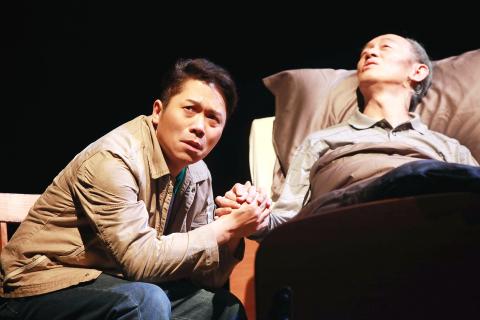What can you accomplish in 14 weeks? In idle hands, a season can easily pass in aimless fun. In the case of Mitch, he learns to love again.
Tuesdays With Morrie (最後14堂星期二的課), Godot Theater’s Chinese-language adaptation of Mitch Albom’s 1997 best-selling novel, is being performed at Taipei’s Metropolitan Hall (台北市社教館城市舞台) until March 11, before moving to the Taichung Chungshan Hall (台中市中山堂) on March 17 and March 18.
Since its premiere last month, the popular tear-jerker has clocked up more than 40 shows, and this is its fifth revival.

Photo Courtesy of Godot Theater
The production will move to Shanghai after its Taiwan run.
Directed by Daniel Yang (楊世彭), the production boasts theater thespian Chin Shih-chieh (金士傑) and popular TV actor Pu Hsueh-liang (卜學亮) in the leads.
Adapted from Albom’s autobiographical novel, the play follows the hotshot journalist Mitch as he reconnects with his college mentor Morrie.
Because Morrie is dying from amyotrophic lateral sclerosis, a progressive disease of the nerve cells in the brain and spinal cord that control voluntary muscle movement, Mitch opts to meet him every Tuesday for heart-to-heart conversations for 14 weeks.
The book has sold 14 million copies worldwide and was turned into an Emmy-winning TV movie by Oprah Winfrey in 2000. The book’s Chinese edition has sold more than 700,000 copies in Taiwan.
“This production has been an unexpected hit,” Yang told the Taipei Times in an interview on Thursday last week. “I approached Godot Theater about this heart-moving play and said it might lose money, but it actually became a crowd drawer.”
As the latest mentor/protege heart-warmer in the vein of Good Will Hunting and Finding Forrester, this inspirational play’s unflinching depiction of death tackles the taboo surrounding the topic.
“The story covers marriage, family, father-and-son relationships and friendship,” Yang said. “Everyone will find something to relate to. The audiences really react to the performance and the story.”
At the heart of the story is the long series of candid chats on topics ranging from life to love. Because of its empowering theme, the play has been dubbed “chicken soup” theater in China.
“Most audiences have read or heard about this book and they come expecting an elevating experience,” Yang said. “The lessons between Mitch and Morrie are over, but our lessons with the audiences continue.”

Taiwan has next to no political engagement in Myanmar, either with the ruling military junta nor the dozens of armed groups who’ve in the last five years taken over around two-thirds of the nation’s territory in a sprawling, patchwork civil war. But early last month, the leader of one relatively minor Burmese revolutionary faction, General Nerdah Bomya, who is also an alleged war criminal, made a low key visit to Taipei, where he met with a member of President William Lai’s (賴清德) staff, a retired Taiwanese military official and several academics. “I feel like Taiwan is a good example of

March 2 to March 8 Gunfire rang out along the shore of the frontline island of Lieyu (烈嶼) on a foggy afternoon on March 7, 1987. By the time it was over, about 20 unarmed Vietnamese refugees — men, women, elderly and children — were dead. They were hastily buried, followed by decades of silence. Months later, opposition politicians and journalists tried to uncover what had happened, but conflicting accounts only deepened the confusion. One version suggested that government troops had mistakenly killed their own operatives attempting to return home from Vietnam. The military maintained that the

Taipei Mayor Chiang Wan-an (蔣萬安) announced last week a city policy to get businesses to reduce working hours to seven hours per day for employees with children 12 and under at home. The city promised to subsidize 80 percent of the employees’ wage loss. Taipei can do this, since the Celestial Dragon Kingdom (天龍國), as it is sardonically known to the denizens of Taiwan’s less fortunate regions, has an outsize grip on the government budget. Like most subsidies, this will likely have little effect on Taiwan’s catastrophic birth rates, though it may be a relief to the shrinking number of

Since its formation almost 15 years ago, Kaohsiung rock band Elephant Gym (大象體操) has shattered every assumption about contemporary popular music, and their story is now on screen in a documentary titled More Real Than Dreams. It’s an unlikely success story that says a lot about young people in Taiwan — and beyond. For a start, their sound is analog. In the film, guitarist Tell Chang (張凱翔) proudly says: “There is no AI in our sound.” His sister, bass player KT Chang (張凱婷) is the true frontwoman — less for her singing abilities than for her thunderous sound on the instrument. Fast like